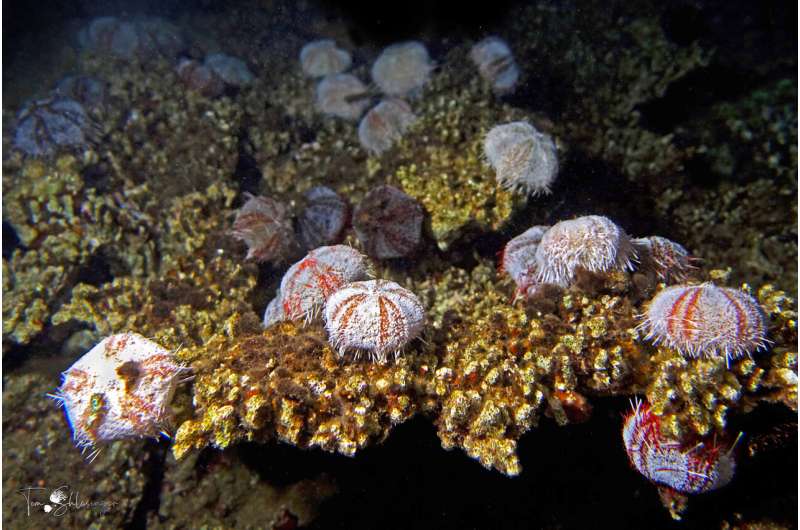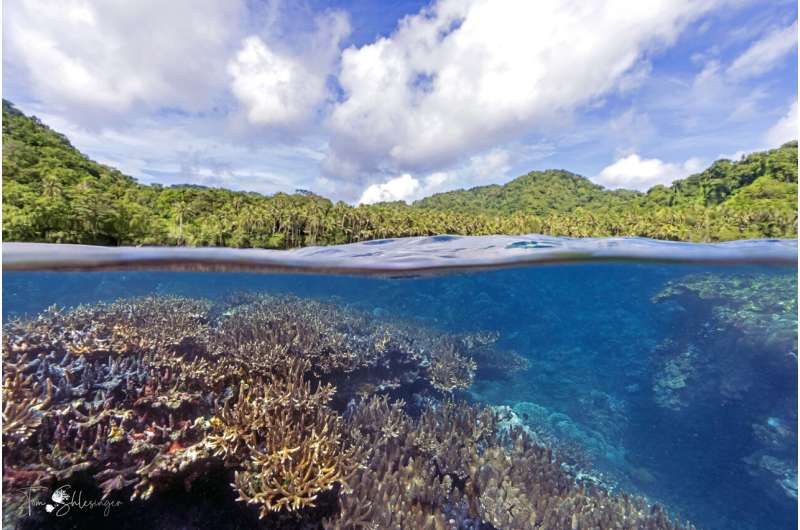Sea urchins can be key players on coral reefs as they are both herbivores, regulating algal growth, and bioeroders, who erode the reef structure. An interesting finding of this study is that while reefs with modest densities of sea urchins had positive trajectories in the year following bleaching events, reefs with exceptionally high densities of urchins often had negative trajectories following bleaching events. Credit: Tom Shlesinger, Gulf of Aqaba and Eilat, Red Sea, 2015
Australian researchers recently reported a sharp decline in the abundance of coral along the Great Barrier Reef. Scientists are seeing similar declines in coral colonies throughout the world, including reefs off of Hawaii, the Florida Keys and in the Indo-Pacific region.
The widespread decline is fueled in part by climate-driven heat waves that are warming the world's oceans and leading to what's known as coral bleaching, the breakdown of the mutually beneficial relationship between corals and resident algae.
But other factors are contributing to the decline of coral reefs, as well, including pollution and overfishing.
According to a new study, "Local conditions magnify coral loss after marine heatwaves," published in the journal Science, what's key to coral reefs surviving climate-driven heatwaves and subsequent bleaching is managing global climate change—and local conditions.
"We found a strong signal that local conditions influenced outcomes for corals after heat-stress events," said Mary Donovan, lead author of the study and assistant professor in the School of Geographical Sciences and Urban Planning at Arizona State University.
"Although some have argued that climate change is so overwhelming that conserving coral reefs on a local scale is futile, our study found that local impacts on coral reefs magnified the effects of climate-driven heatwaves," said Donovan. "This suggests that local action to conserve coral reefs can help reefs withstand the effects of climate change."
Climate change threatens coral reefs by causing heat stress events that lead to widespread coral bleaching and mortality. This study found that local stressors act synergistically with climate change to kill corals. However, these findings also offer an optimistic premise that effective local management, alongside global efforts to mitigate climate change, can help coral reefs survive. Credit: Tom Shlesinger, Papua New Guinea, 2018
The importance of local conditions to reef survival is often dismissed, making those who rely on coral reefs for their livelihood or those who are stewards of the reefs feel hopeless. Yet, coral reefs are profoundly important.
"Coral reefs are important on a fundamental level for biodiversity," said Donovan, who is also a member of ASU's Center for Global Discovery and Conservation Science.
Two local issues that can have a large effect on the health of coral reefs are nutrient pollution and overfishing. Overfishing depletes the number of fish that eat algae and keep the reef's ecosystem in balance. For example, depleting the number of herbivorous fish can lead to an overabundance of macroalgae, which can indicate a stressed ecosystem.
Meanwhile, nutrient pollution from land, including run off from golf courses, agriculture and urban development along coastlines greatly threatens reefs.
However, both overfishing and pollution offer opportunities for management strategies that could boost coral reefs' resistance to climate change.
Study data were collected world-wide by professional scientists as well as trained and certified community-scientists on behalf of Reef Check. Only data collected during and within one year after a climate-driven bleaching event were analyzed to determine the health of the reef. Donovan is now applying this research to local efforts to address conditions that harm reefs.
"Coral reefs take up some of the smallest area on our planet, but harbor the most species of any ecosystem on Earth, and they're also incredibly important to people. People all over the world rely on reefs for food security, for coastal protection from storms, and for other livelihoods. In many parts of the world, it isn't only a question of beauty, but a question of survival."
More information: M.K. Donovan el al., "Local conditions magnify coral loss following marine heatwaves," Science (2021). science.sciencemag.org/cgi/doi … 1126/science.abd9464
"Local management matters for coral reefs," Science (2021). science.sciencemag.org/cgi/doi … 1126/science.abi7286
Journal information: Science
Provided by Arizona State University

























